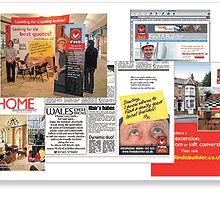Communicating with your builder
No matter how large or small your building project is, you will need to
establish good lines of communication with your builder for it to be a
success.
Most of us only undertake building projects once or twice during the
period we live in a property. This means that we are not used to handling
work of this complexity or length. That’s one of the reasons why we want to
hire a builder we can trust, who will complete the work to a high standard
within an agreed budget and timescale. What we often forget is that the
builder also needs to be able to trust the client; to be paid on time and to
be told of any changes that may affect the work they are doing.
If you are embarking on a big project such as a loft conversion, large
extension or complete house-build, it makes sense to establish a good
relationship with your builder. It will make it easier for you to solve the
problems that occur during your project and to complete the job on time with
the minimum amount of hassle. Getting on with your builder could be the
difference between success and failure.
How do I communicate with my builder?
Start working with your builder from the moment he comes to quote for the
job. Although you may have three or more builders quoting for your project,
you won’t know which one to pick until the quotes come in, so make sure you
treat each one politely, give them as much information as you have and ask
relevant questions. Show them that you are interested in the quality of
their work and that you are prepared to work around their needs. Ask for a
detailed quote; that way, the builder knows you want to keep close track of
the project and that they will have something to measure progress against.
Once you have decided on your builder, you should both sign a contract. A
builder contract is beneficial to both parties; the client can see exactly
what work is going to be done and in what order, and the builder has a
written agreement on payment, so he can order materials and book additional
contractors accordingly. If there are any changes made during the building
job, they need to be signed off by both parties.
Making the first move
If you come across a problem or you have a query during the building
process, speak to your builder as soon as possible. Delaying could mean that
the problem is covered up by other work and will be more expensive to put
right. It’s worth going round your project at the end of each day, so that
anything that you want to query can be raised the following morning. Also
make sure that you speak to the builder direct, rather than complaining to
other contractors or workers. Establishing communication with one person
during the project makes it easier to manage and avoids confusion. It may
even be wise to set up a regular meeting with your builder – perhaps 15
minutes first thing in the morning – just to assess progress and find out
what’s expected during the day.
Keep your side of the bargain
You can’t expect your builder to work to contract if you don’t. For large
projects, you will need to agree a payment schedule with your builder. This
allows them to order materials and equipment in the knowledge that they will
be reimbursed. If you have agreed to this, then its your responsibility to
ensure that your builder is paid on time. Not only will this maintain your
relationship, it may mean that building phases are completed more quickly,
because the builder is confident enough to order materials as they are
needed.









